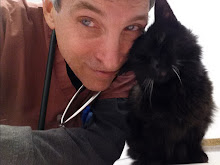Until I arrived at the Gulf Coast to assist with the US Fish and Wildlife Service's damage impact studies from the Deepwater Horizon spill, I never considered the pelican to be much more than an odd and humorous backdrop to the region.
The graceful neck supports a head that sports an equally ungraceful beak - a long brown structure with a split character of its own. The top side is hard as bone, while the beak’s belly is a soft and pliable pouch. A prominent hook abruptly ends the contradiction, and the entire assemblage is held downward against the breast, as if in a bid to keep the embarrassment tucked and hidden. This top-heavy package is supported by two stout, webbed feet. It is as if God, after creating the gracefully delicate features of the heron, the fearsome smart lines and stern glare of the hawk, and the bright colorful songbirds, went rummaging through his spare parts drawer and made the pelican from what was left.
Our work involves close handling of these wild birds. Moving stealthily toward a row of pilings (where pelicans love to roost), I am unnerved to be scrutinized by a glaring blue eye. Like it or not, I am the focus of this creature - he knows I am here and sizes me up with unabashed judgment - carefully contemplating his counter-move. As our boat drifts quietly through the invisible line he has drawn, he opens his wings and launches himself into the air. His wings unfold in a tremendous span as he drops towards the water’s surface trusting the palm of God to catch him – which it does with barely an inch to spare. A few lazy flaps of those huge wings and he seems propelled by unseen angels. He continues to calculate, coolly deliberating his next move. Will he circle around and land again on the same group of pilings, or will he continue to another set?
Every pelican is different, each occupying a different piling. As we glide quietly past them, some leave earlier, others stretch their wings out from their bodies in threat of flight, but don't make the move just yet. Still others just sit and glare, wings tucked tight, determined not to leave their roost, assigning guilt with their eyes, indignant that we would dare disturb their siesta.
Ultimately all the birds flee, heading for other pilings. Perhaps one will land on a piling with a soft leg trap - a device that harmlessly clamps the leg when the bird lands upon it. The pelican is no stranger to trapping, being well-practiced in the art himself. He dives down and fills his pouch quietly in fluid motion. In turn, the loud and sudden report of our metal trapping tools work with all the congruity of a rock guitar grinding out Tchaikovsky’s Swan Lake. Despite our intentions, we lack any grace as we awkwardly step into the pelicans’ world.
A pelican soon lands on a trap and the clamp snaps closed. He immediately flies off the piling but the weight of the trap prevents him from taking flight. He splashes into the water. His wings beat but he remains on the surface. We move in quickly, avoid his attempts to bite and gently grasp his head from behind. While another person controls his long beak, we scoop him into the boat. A light cloth covers his head to calm him.
We have samples to take, observations to record, and equipment to attach. He is brought quickly to our makeshift base of operations 50 yards away, the low concrete platform of a small, unmanned oil rig. He is held while I draw blood, clip and pluck feathers, and examine him for signs of oil contamination. Then I hold him while the crew attaches a metal identification band and affixes a transmitter (much like a small backpack).
I find that the gentlest of holds work best; he relaxes perhaps because he senses that I relax. I am tuned into him fully, and as I cradle him, we are one in that moment. As he starts to struggle, I gently increase just enough restraint to counter it; and as he relaxes again, so do I. In this subtle quiet dance, we work together, pelican and I, and perhaps understand each other as much as our limited perspectives allow. The cloth that covers his eyes falls off, and a blue iris regards me, drilling into my soul. In that moment, I am not merely seen; I am possessed. Our universes overlap and spill into each other’s.
The transmitter is affixed, and he is ready to go. We carry him to the end of the short dock, and release him. This time, the palm of God does not catch him; he flaps once or twice and gently and settles with heavy resignation into the water. I am heartbroken that we have imposed such a cruel counterbalance to his delicate world. He stretches his wings, flaps a few times more, but remains bound to the water. He relaxes as if in acceptance, floating away from us. Then in a deliberate effort of determination and faith, he breaks his bond and his wings gracefully carry him away.
As I watch him disappear, I wonder if he will find his friends. We each return to our own worlds. I know I will never forget him. I wonder how long he will remember me. I am stirred by the thought that a contemplation of me, however unkind, may tumble about in his mind, gliding over the marshes, swamps and open water of the Gulf Coast.
Subscribe to:
Post Comments (Atom)








No comments:
Post a Comment